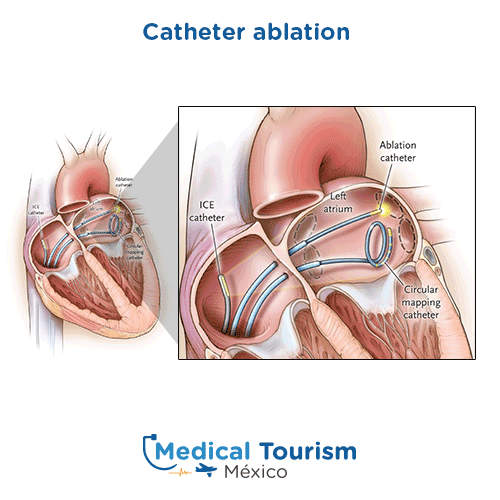The most reliable doctors in Mexico
Catheter ablation information and locations in Mexico
Catheter ablation is a procedure that uses radiofrequency energy to correct heart rhythm
conditions (arrhythmias). Doctors used a catheter inserted on a vein to create small scars
inside the heart.
This procedure can be done under general anesthesia. Specialists create small incisions on the
groin, neck, or arm to insert 3 or 4 catheters into the arteries to reach the heart. The
catheters have electrodes on their tips that produce mild radiofrequency heat energy, this will
destroy the muscle cells responsible for the abnormal electrical signals.
Get professional services with the best heart surgeons in Mexico!
Benefits
Minimally invasive procedure
Can reduce the need for other surgeries
Improves quality of life
High success rates
Can reduce the need for other surgeries
Improves quality of life
High success rates
Includes
Biocompatible stent graft
Catheter ablation
Procedure:
4 hrs.
Hospital stay: 2 hrs.
Cleared to fly: 2 - 5 days
Hospital stay: 2 hrs.
Cleared to fly: 2 - 5 days
After surgery
Out of town patients’ follow-ups can be scheduled with the cardiovascular surgeon face-to-face or virtually.
Patients are clear for flying after 2 - 5 days from the catheter ablation.
Note: Follow-ups can be arranged as face-to-face or virtually. If needed, you can go to your primary care physician to remove sutures or get medication adjustments.
As an Amazon Associate, we earn from qualifying purchases.
Take a look at one of our medical tourism essentials for cardiology procedures.
Take a look at one of our medical tourism essentials for cardiology procedures.
Additional images
View additional images for this procedure.

View more


Locations
Select the city of your choice to seethe doctors profile.
Ciudad Juarez, Chih.
Dr. Javier A. Torres
View more

Catheter ablation frequent questions
Get answers to our most frequently asked questions and what to expect after the surgery.
Am I a candidate for catheter ablation?
Candidates for surgery are usually experiencing symptoms of arrhythmia, and abnormal heartbeat.
Will the procedure be painful?
Doctors use general anesthesia so you don’t feel pain. You could feel some pressure around the area where the specialist is working.
How do I prepare for the procedure?
Your specialist will perform an examination to learn about your medical history. You will be asked to stop eating and taking medication the midnight before the procedure.
What happens after the procedure?
You’ll be taken to a recovery room right after the catheters are removed. You’ll be under observation, and depending on your condition you could go home after 6 hours or spend a night at the hospital. We recommend you speak with your specialist to learn how long will your recovery be.
How long will recovery take?
Specialists usually recommend spending about 3 weeks off of work, and some patients need to take blood thinners for 3 months.
Recent news
Disclaimer: This information does not reflect the medical advice from our clinics. All cases are different and this treatment may not suit you. Always refer to a medical professional with the certification and experience. All of our physicians are fully qualified to perform these procedures. For more information and diagnosis contact one of our top specialized clinics.
In all medical procedures, there are chances of complications, the specialist will provide you detailed information about the risks of the procedure, talk to the specialist directly.
In all medical procedures, there are chances of complications, the specialist will provide you detailed information about the risks of the procedure, talk to the specialist directly.





